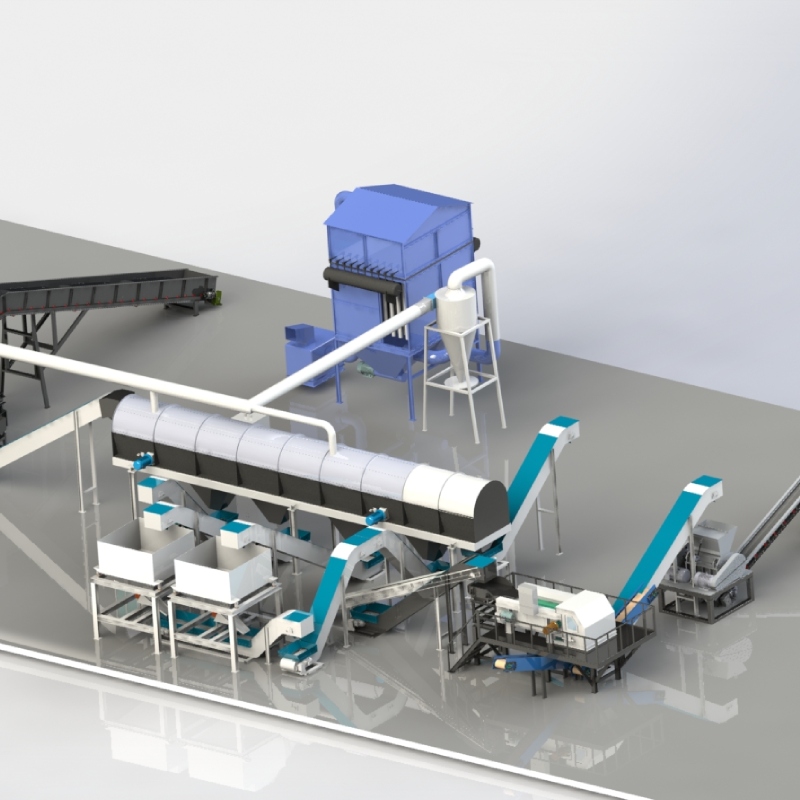

វិច្ឆិកា . 15, 2024 07:20 Back to list
The Importance of Cable Granulation in Recycling
Cable granulation is a crucial process in the recycling industry that focuses on the efficient recovery of valuable materials from waste cables. As economies grow and technology advances, the demand for electronic and electrical devices has surged, leading to an increase in discarded cables. These cables, often made up of various metals and plastics, are not only a waste resource but also pose environmental hazards if not properly disposed of. Cable granulation provides an effective solution to reclaim materials, reduce waste, and promote sustainable practices.
The cable granulation process begins with collecting waste cables from various sources, such as construction sites, manufacturing units, and electronic waste recyclers. Once collected, the cables are sorted to remove any non-metal components, such as connectors or insulation materials. This step is essential to ensure that the granulation process is efficient and that the recovered materials are of high purity.
Following sorting, the cables are fed into granulation machines designed to shred the cables into smaller pieces. This shredding not only makes it easier to separate materials but also enhances the efficiency of the subsequent separation processes. The granulated material consists of a mix of copper, aluminum, and plastic, making it necessary to separate these components for further processing.
Separation technologies play a significant role in the cable granulation process. The granulated material is subject to various techniques, such as air classification, magnetic separation, and density separation. Air classification uses air streams to separate lighter plastic materials from heavier metals. Magnetic separation is employed to extract ferrous metals, while density separation helps in isolating non-ferrous metals like copper and aluminum from the plastics. These technologies ensure that recovered materials are as pure as possible, maximizing their value in the recycling market.
The benefits of cable granulation are multifaceted. Firstly, it contributes to the conservation of natural resources by recovering valuable metals like copper and aluminum, which can be reused in manufacturing new cables or other products. This reduces the need for mining and extraction, activities that can be harmful to the environment. Moreover, recycling metals uses significantly less energy compared to producing them from raw materials, further reducing the environmental footprint of metal production.

Secondly, cable granulation helps mitigate the environmental risks associated with electronic waste. Many cables and their components can release toxic substances when disposed of improperly. By facilitating proper recycling, the cable granulation process minimizes the chances of hazardous materials contaminating soil and water sources, thereby protecting ecosystems and public health.
In addition to environmental benefits, cable granulation presents economic advantages. The recycling industry has become a significant source of employment, providing jobs in collection, sorting, processing, and sales. Furthermore, as the demand for recyclable materials continues to rise, investing in cable granulation can yield substantial returns, benefiting businesses and communities alike.
Governments and regulatory bodies are increasingly recognizing the importance of cable recycling and granulation. Policies aimed at reducing electronic waste and promoting recycling initiatives are being implemented globally. Such regulations not only encourage proper disposal practices but also support the development of advanced technologies in the recycling sector.
Public awareness plays a vital role in the success of cable granulation initiatives. Educating individuals and businesses about the importance of recycling cables and the environmental impacts of cable waste can lead to increased participation in recycling programs. Community engagement in e-waste drives and educational campaigns can further enhance the effectiveness of cable granulation efforts.
In conclusion, cable granulation is an essential process that addresses the growing challenge of electronic waste while promoting sustainability and resource conservation. By recovering valuable metals and reducing environmental hazards, cable granulation not only supports a circular economy but also contributes to a healthier planet. As technology continues to evolve, investing in and fostering cable granulation efforts will be critical in ensuring a sustainable future for generations to come.
Latest news
Troubleshooting Common Eddy Separator Problems
NewsJul.04,2025
The Role of Metal Recycling Plants in Circular Economy
NewsJul.04,2025
The Impact of Recycling Line Pickers on Waste Management Costs
NewsJul.04,2025
Safety Features Every Metal Shredder Should Have
NewsJul.04,2025
How Industrial Shredders Improve Waste Management Systems
NewsJul.04,2025
How Cable Granulators Contribute to Sustainable Recycling
NewsJul.04,2025